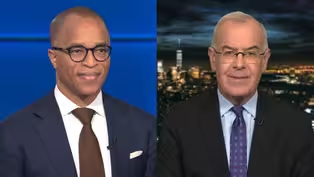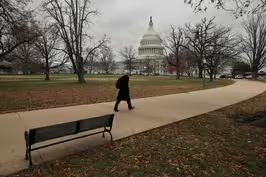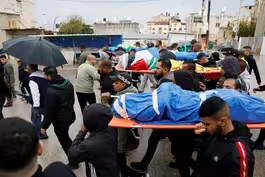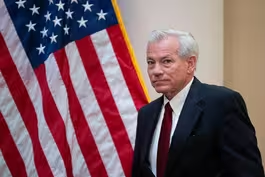
Former ambassador on challenges to rebuilding Syria
Clip: 12/20/2024 | 7m 35sVideo has Closed Captions
Former U.S. ambassador to Syria outlines challenges to rebuilding the war-torn country
American diplomats were in Syria for the first time since the U.S. shut its embassy in Damascus in 2012. They met with Syria's new ruler, Ahmed al-Sharaa, and announced the $10 million bounty the U.S. placed on him would be removed. For perspective on the latest developments, Geoff Bennett spoke with Theodore Kattouf, the U.S. ambassador to Syria during the George W. Bush administration.
Problems playing video? | Closed Captioning Feedback
Problems playing video? | Closed Captioning Feedback
Major corporate funding for the PBS News Hour is provided by BDO, BNSF, Consumer Cellular, American Cruise Lines, and Raymond James. Funding for the PBS NewsHour Weekend is provided by...

Former ambassador on challenges to rebuilding Syria
Clip: 12/20/2024 | 7m 35sVideo has Closed Captions
American diplomats were in Syria for the first time since the U.S. shut its embassy in Damascus in 2012. They met with Syria's new ruler, Ahmed al-Sharaa, and announced the $10 million bounty the U.S. placed on him would be removed. For perspective on the latest developments, Geoff Bennett spoke with Theodore Kattouf, the U.S. ambassador to Syria during the George W. Bush administration.
Problems playing video? | Closed Captioning Feedback
How to Watch PBS News Hour
PBS News Hour is available to stream on pbs.org and the free PBS App, available on iPhone, Apple TV, Android TV, Android smartphones, Amazon Fire TV, Amazon Fire Tablet, Roku, Samsung Smart TV, and Vizio.
Providing Support for PBS.org
Learn Moreabout PBS online sponsorshipGEOFF BENNETT: American diplomats were in Syria today for the first time since the U.S. shut its embassy in Damascus in 2012.
They met with Syria's de facto new ruler, Ahmed al-Shar'a, and announced that the $10 million bounty the U.S. placed on him would be removed.
Assistant Secretary of State Barbara Leaf told reporters al-Shar'a was committed to ensuring that terrorist groups cannot pose a threat inside Syria or to other countries.
BARBARA LEAF, U.S. Assistant Secretary of State: I would characterize the discussion as quite good, very productive, detailed, rearranged over a wide set of issues, domestic and external.
He came across as pragmatic.
It was a good first meeting.
We will judge by deeds, not just by words.
GEOFF BENNETT: U.S. officials also said they're expanding their search for Austin Tice, the American journalist who was kidnapped in Damascus 12 years ago.
For perspective, we turn now to Theodore Kattouf.
He was U.S. ambassador to Syria during the George W. Bush administration.
Thanks for coming in.
THEODORE KATTOUF, Former U.S.
Ambassador to Syria: My pleasure.
GEOFF BENNETT: Help us understand the significance of the U.S. dropping the $10 million bounty it had offered for the Syrian rebel leader whose forces led to the ouster of Bashar al-Assad.
THEODORE KATTOUF: Well, I think it's a very positive sign.
Ahmed al-Shar'a at one point was an Islamic Stater.
At another point, he was al-Qaida.
Then he had his own offshoot in Syria, the Nusra Front.
But he and the organization Hay'at Tahrir al-Sham seems to have evolved and recognized that they can't rule Syria, they can't govern Syria without changing, to some extent, their Islamic or Islamist ideology and being inclusive and much more tolerant, because Syria is a mosaic of many minorities, with the Sunnis perhaps being the majority.
But within that grouping of Sunni Muslims.
There are many secularists or many people who don't want Islamist rule.
GEOFF BENNETT: What is the U.S. interest in Syria right now?
THEODORE KATTOUF: Well, I think the first interest is that it doesn't become a cockpit for exporting terrorism, as Afghanistan was and the like.
And Syria has ISIS still out in the desert, in the western desert of Syria, and the United States has about 2,000 troops there.
We have recently increased the number of troops, and they are there to work with what's known as the Syrian Democratic Front, but is largely a Kurdish organization, military organization, to root out ISIS.
And the Kurds actually guard some very huge prisons containing thousands of ISIS fighters and their families.
GEOFF BENNETT: Is it in the U.S. interest then to lift sanctions to provide more humanitarian aid and to encourage other countries to do the same?
THEODORE KATTOUF: I think it is.
I mean, Barbara Leaf, our assistant secretary, who we just heard from, it's her job as a diplomat to be positive and hopeful, but, in this case, I think it's the right thing to do, because Ahmed Shar'a recognizes that he has a country in ruins and people are suffering, and he has to deliver for them.
If he wants to consolidate HTS' position in Syria and stamp out resistance, then people have to have hope.
And that hope will come through the international community first providing humanitarian aid, but then reconstruction aid and even help with governance.
And Shar'a seems to me a very astute fellow who's learned a lot and come a long way.
I'm not saying he couldn't reverse himself.
Plenty of leaders have.
I'm old enough to remember Castro in Cuba who told us he was a democrat back in '59 and '60, and turned out to be a communist leader.
GEOFF BENNETT: Right.
THEODORE KATTOUF: So people can say one thing and do another.
Ahmed Shar'a not only has to talk the talk.
He's going to have to walk the walk.
GEOFF BENNETT: You have just articulated one of the immediate risks that Syria faces.
What are some of the others right now after the fall of Assad?
THEODORE KATTOUF: Oh, there are so many, Geoff.
The civil war is really not over.
We have a truce between Turkish or Turkish-backed forces and the Kurdish forces I just referred to in Northeastern Syria, but it's only a matter of days before that truce expires.
So we could see, again, fighting in that part area.
Not only that, but we could see more extremist elements from Hay'at Tahrir al-Sham or other allied organizations trying to push Shar'a aside because he's too moderate.
We also have many other things that can happen.
I mentioned ISIS and them gaining a bigger foothold and expanding the reach in Syria.
And, of course, Israel's been taking territory on the Golan that was supposed to be demilitarized in an agreement between Hafez al-Assad and the then Israeli government.
And that's putting pressure on Shar'a too.
He doesn't want a problem with Israel.
He doesn't want to have to be a confrontational leader.
But he's -- they're embarrassing him badly.
GEOFF BENNETT: The outgoing administration is engaged in this frantic round of diplomacy.
But president-elect Donald Trump has made clear that Syria, as he says, is not our fight.
How might his anti-interventionist world view affect the U.S. approach moving forward?
And what might that mean for Syria?
THEODORE KATTOUF: Well, first of all, we have been working with the Kurds in Northeastern Syria since about 2012.
You had Ambassador Jeffrey, I believe, on the show, who said, we never had an agreement with the Kurds for an independent Kurdish state or even a quite autonomous region.
But there is a moral obligation there.
The Kurds have been abandoned more than once by the U.S. and the West.
And if a slaughter takes place, their blood is going to be on U.S. hands.
And Turkey has said not only is ISIS a terrorist organization, but the Syrian Democratic Forces, i.e., the Kurds, are also a terrorist organization, something, of course, we don't agree with.
Our interest is that Syria not be a totally failed state and ISIS not -- and other organizations, al-Qaida, not be able to export terrorism to the West and to Europe and the like.
And if Trump pulls out too quickly, if he throws up his hands and says, I'm not giving any aid, let the Arabs worry about it, et cetera, without U.S. leadership, things could deteriorate very quickly.
So I'm hoping his advisers can talk him into a -- let's say a more moderate withdrawal, since he criticized the withdrawal from Afghanistan.
We shouldn't repeat that.
GEOFF BENNETT: Ambassador Ted Kattouf, thanks so much for your insights.
We appreciate it.
THEODORE KATTOUF: Thank you, sir.
Brooks and Capehart on Trump's role in the funding battle
Video has Closed Captions
Clip: 12/20/2024 | 10m 27s | Brooks and Capehart on Trump's role in the chaotic funding battle in Congress (10m 27s)
Court weighs who owns a 'vibe' after influencer sues another
Video has Closed Captions
Clip: 12/20/2024 | 5m 16s | Court weighs who owns a 'vibe' after online influencer sues another for copying her look (5m 16s)
House votes to avoid government shutdown, approves funding
Video has Closed Captions
Clip: 12/20/2024 | 7m 6s | House votes to avoid government shutdown and approves bipartisan funding bill (7m 6s)
How life in West Bank has become brutal and unpredictable
Video has Closed Captions
Clip: 12/20/2024 | 10m 15s | How life in the West Bank has become brutal and unpredictable after Oct. 7 (10m 15s)
Schweikert says Musk's political influence is 'wonderful'
Video has Closed Captions
Clip: 12/20/2024 | 6m 10s | GOP Rep. Schweikert says Musk's political influence in Washington is 'wonderful' (6m 10s)
Providing Support for PBS.org
Learn Moreabout PBS online sponsorship
- News and Public Affairs

FRONTLINE is investigative journalism that questions, explains and changes our world.

- News and Public Affairs

Amanpour and Company features conversations with leaders and decision makers.












Support for PBS provided by:
Major corporate funding for the PBS News Hour is provided by BDO, BNSF, Consumer Cellular, American Cruise Lines, and Raymond James. Funding for the PBS NewsHour Weekend is provided by...




